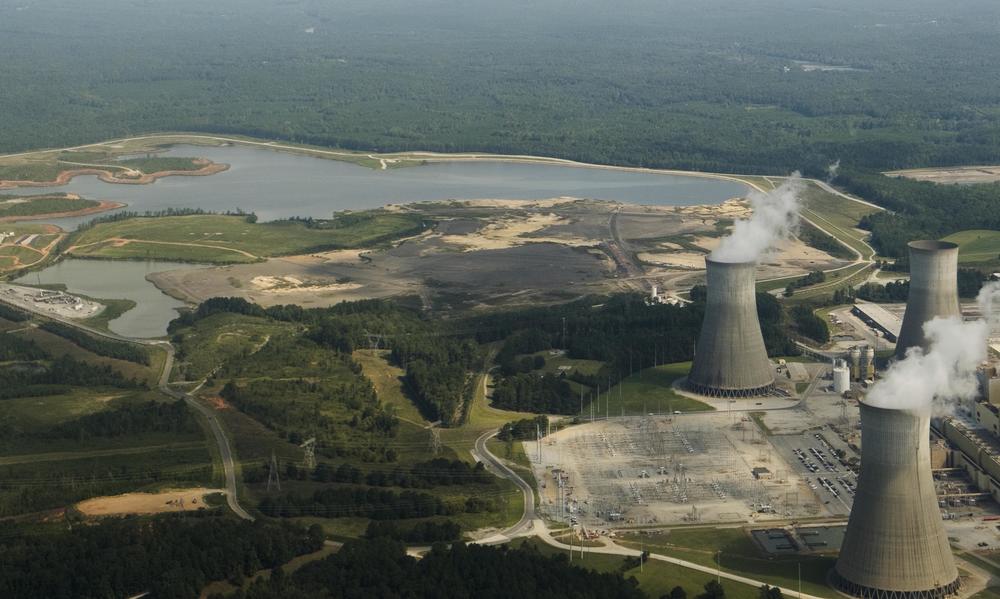
Caption
Georgia Power's Plant Scherer, right, and its Ash Pond 1, upper left, in September of 2023.
Credit: Grant Blankenship/GPB News

Georgia Power's Plant Scherer, right, and its Ash Pond 1, upper left, in September of 2023.
The Environmental Protection Agency is rolling back dozens of rules, programs and grants — a handful of which will alter regulations for Georgia’s coal-fired power plants.
EPA Administrator Lee Zeldin announced the more than 30 rollbacks in the first week of March.
Georgia is home to two coal-fired power plants, Plant Bowen in Euhlarlee and Plant Scherer in Juliette, which happens to be the largest coal-fired power plant in the world.
In Zeldin’s announcement, he said he wants to “reconsider” many different regulations on power plants, including those on water pollution limits and mercury and air toxics standards, often referred to as MATS, according to a press release from the EPA on March 5.
Former administrator for the EPA’s southeast region, Daniel Blackman, said loosening these regulations will be “catastrophic” and will “hurt a lot of communities.”
“These rollbacks ultimately will cripple the ability for us to measure emissions and monitor clean air and clean water,” Blackman said.
The EPA determined it was “appropriate and necessary” to regulate coal and oil-fired electric utilities under the Clean Air Act in December 2000. After years of legal back-and-forth, the Mercury and Air Toxics Standards were finalized in 2012, requiring coal and oil-fired power plants to meet emission standards by spring 2016. In spring 2020, President Donald Trump argued the rule could not be justified as “appropriate and necessary,” but former President Joe Biden’s administration reaffirmed it in 2021.
Now, it’s officially being reconsidered.
“MATS ... has achieved significant health and environmental benefits by reducing a broad range of hazardous air pollutants,” the EPA’s website reads. “By 2017 mercury emissions had dropped by 86 percent — down to approximately 4 tons. Acid gas hazardous air pollutants and non-mercury metals are down 96 percent and 81 percent respectively when compared to 2010 levels.“
The EPA’s website now features a reconsidering MATS fact sheet, which says one of the reasons for this action is that the “industry believes ... there are no meaningful public health benefits to be gained from the rule’s mandated reduction” in hazardous air pollutants.
But Biden’s EPA found otherwise: the agency previously estimated these standards would avert up to 11,000 premature deaths, 4,700 heart attacks and 130,000 asthma attacks every year.
Zeldin also announced they’re going to “reconsider” the Effluent Limitations Guidelines, or ELGs, which sets limits on four different wastewaters generated from coal-fired power plants.
“These regulations apply to about 40,000 facilities that discharge directly to the nation’s waters, 129,000 facilities that discharge to municipal sewage treatment plants, and certain construction sites,” the EPA’s website reads. “Cumulatively, ELGs prevent the discharge of over 700 billion pounds of toxic pollutants annually.”
In addition to this, the EPA is considering immediate relief from some leachate reduction requirements and reevaluating the cost and availability of membrane technology for treatment, according to the release.
Membrane technology is a water treatment method that uses a physical barrier to separate contaminants from water. It’s exactly what residents in Juliette have fought to have installed at Plant Scherer.
A mass tort lawsuit filed by 45 Juliette residents in July 2020 alleged that coal ash from Plant Scherer had contaminated their drinking water. The lawsuit demanded that Georgia Power install a protective barrier in the coal ash pond to prevent further leakage into groundwater. Since then, there have been around 10 separate lawsuits.
“Areas like Juliette are far been behind on getting justice and clarity on how coal ash is being is impacting them, how coal ash ponds and the lack of lining those ponds (is impacting them),” Blackman said. “My fear (with these recent changes) is that we’ll see less transparency, challenges to litigation, but then also just, quite frankly, this free fall where communities like Juliette will lose the little progress they’ve made.”
Georgia Power is trying to close the ponds at Scherer by leaving the ash submerged in groundwater, known as “cap in place,” but the Biden-era EPA said it violated their rules.
The Georgia Environmental Protection Division is currently reviewing Georgia Power’s proposal, a coal combustion residuals permit application, which provides a groundwater monitoring plan and a closure plan for the handling and disposal of CCRs from the ash pond, according to Sara Lips, EPD director of communications and community engagement.
“The current Scherer AP-1 closure plan (which is still under review) proposes to close the ash pond in place over an approximate 10 year period,” Lips said in an email.
Georgia Power is currently “reviewing the recent announcements ... to understand potential implications for our business and customers,” said Matthew Kent, Georgia Power spokesperson.
When asking Blackman what “reconsider” meant in the federal EPA’s announcement last week, whether it meant getting rid of the regulations completely or just amending them, he did not know.
“I’ve worked with EPA as a private citizen and policy advisor for over a decade, and I was appointed for three years under the previous administration ... and I’ve never seen this amount of confusion,” Blackman said. “The job of the federal government is to put out very clear and definitive information, and we haven’t gotten that. The verbiage is very unclear and it’s massively confusing.”
This story comes to GPB through a reporting partnership with Macon Telegraph.